Politics Taken Too Far? Kano Youth Burn Money In Protest Amid Rising Poverty

A prominent musician and member of the All Progressives Congress (APC), Dauda Kahutu Rara, shared a video on September 10 where he asked people to donate N1,000 each before releasing his new song on President Muhammadu Buhari.
This caught the attention of thousands of people, mostly youth in Kano State, who support the opposition Peoples Democratic Party (PDP), triggering a wave of burning of N1,000 notes in protest.
Speaking to HumAngle, the Caretaker Chairman of the PDP in Kano State, Dr Danladi Umar Abdulhamid Tambarin Kagara, described the incident as unfortunate and borne out of ignorance.
“Many Nigerians do not know the value of our symbols. Nigerian symbols we have – the national flag, coat of arms, national anthem – and we have the public currency, these Nigerian symbols must be respected by every Nigerian in that direction,” he said.
He also criticised the singer for “asking citizens to donate at this crucial time of economic hardship [when] Nigerians cannot afford three meals square in their houses”. He said his request was both unethical and uncalled for.
“And for people who are burning currency, these are what we call nuisance and mischief because the currencies are not theirs; they are for the country and the good people of Nigeria. So, burning the currency is grievous mischief and it is a disrespect to Nigeria as a nation,” Kagara added.
He urged the various security agencies, including the police and Economic and Financial Crimes Commission, to arrest the culprits.
The law establishing the Central Bank of Nigeria criminalises the act of tampering with local currencies and provides that defaulters will be fined and/or imprisoned.
“A person who tampers with a coin or note issued by the bank is guilty of an offence and shall on conviction face imprisonment for a term not less than six months or to a fine not less than N50,000 or to both such fine and imprisonment,” the act states.
“A coin or note shall be deemed to have been tampered with if the coin or note has been impaired, diminished or lightened otherwise than by fair wear and tear or has been defaced by stumping, engraving, mutilating, piercing, stapling, writing, tearing, soiling, squeezing or any other form of deliberate and willful abuse whether the coin or note has or has not been thereby diminished or lightened.”
Sharing his thoughts on the issue, Mahmud Garba Shawai, a lecturer at Nigerian Tulip International College, Kano, said the act of burning naira notes in protest reeked of a lack of discipline, extravagance and economic indiscipline.
“If an individual thinks that sending his money to a political musician is of no use, then, why doesn’t he or she assist his relatives or the needy within his immediate vicinity with at least half of what has been requested instead of tearing or burning?” he asked.
“Rather than commuting such acts, I think the best thing is to consider those who are struggling or are in desperate need of help, those who find it hard to support themselves and their family or those who would value the currency,” said Sadiq Isa, an entrepreneur and resident of Wudil Local Government.
Abdussalamu Muhammad Kani, who lectures at the Department of Economics, Sa’adatu Rimi College of Education, told HumAngle that the trend would likely add to the level of hardship and hunger in the affected communities.
“It is better for an individual to consume or invest using the money rather than burning it or donating wrongly,” he said.
In an interview with some persons who participated in the protest event, a number of them said they later had a rethink and felt sorry.
“I burnt my N1,000 note because I can’t support a singer praising the incumbent government but later I regretted my actions because it is a disrespect of national currency,” said Abdulkadir Shehu, a member of Kwankwasiya.
Adamu Abubakar, also a PDP member, said he did it to express his annoyance but now understood that the act was unlawful.
Not everyone was remorseful, however.
Another member of Kwankwasiya, Dayyabu Rokky, admitted he burnt a N1,000 note and said he was ready to burn more to warn the musician not to seek donations anymore.
Support Our Journalism
There are millions of ordinary people affected by conflict in Africa whose stories are missing in the mainstream media. HumAngle is determined to tell those challenging and under-reported stories, hoping that the people impacted by these conflicts will find the safety and security they deserve.
To ensure that we continue to provide public service coverage, we have a small favour to ask you. We want you to be part of our journalistic endeavour by contributing a token to us.
Your donation will further promote a robust, free, and independent media.
Donate HereStay Closer To The Stories That Matter





